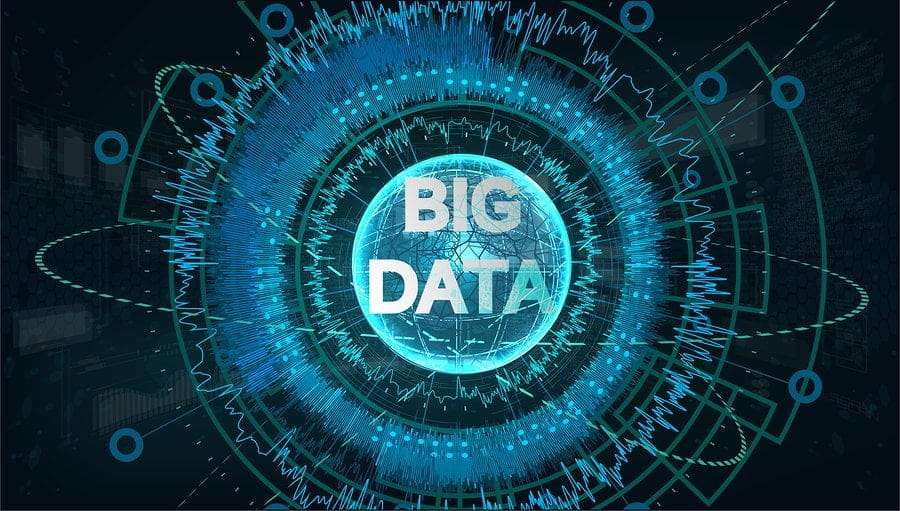Big data in business. What does it look like?
Table of Contents
ToggleDespite the fact that only 26% of companies say they have achieved a data-driven culture, the big data industry continues to grow, with around 218 (2,000,000,000,000,000,000) bytes of data generated each day across all industries, and some estimates placing its value at $77 billion by 2023.
But who is using big data in the business arena, and what type of work is involved? That’s what we’ll be looking at in this article.
Big Data Concepts
Big data consists of extremely large volumes of structured, semi-structured, and unstructured information generated by a diverse array of sources, including business transactions, internet activity, machine data, sensor input, text, videos, and images.
At a conceptual level, big data is typically distinguished by three major characteristics, known as the three Vs:
- Volume – the huge amounts of data involved.
- Variety – which reflects the diversity of sources, types, and formats of the information.
- Velocity – which refers both to the speed at which big data is generated and the speed with which organizations have to process it in order to keep pace.
For businesses, computational analysis of very large data sets can reveal patterns, trends, and associations — especially in connection with human behavior and interactions — that fuel greater operational efficiency, enhance customer engagement, reduce costs, predict future outcomes, and enable new opportunities.
Big Data In Business
Analysis of information and the derivation of insights from it can create opportunities for organizations in any industry. Big data applications apply across a range of disciplines, including health care, finance, manufacturing, retail, software development, government, education, and infrastructure provision.
Big data analytics and data management are at work in the business arena in numerous areas, including:
- Analyzing customer and transaction data to reveal shopping habits and consumer behavior trends.
- Targeted advertising and the personalization of customer experiences.
- Fuel and route optimization for the transport industry.
- Predictive inventory ordering and supply chain optimization.
- Monitoring health conditions through data from wearables and remote diagnostics.
- Personalized health plans for cancer patients.
- Fraud and risk management in the financial services sector.
- Demand and preference-based media streaming.
- Real-time data monitoring and cyber security.
Big Data Business Professionals
Solution and service providers in the big data industry (and those private organizations fortunate enough to recruit or nurture them in-house) employ a range of specialist talent for the management, analysis, and deployment of big data projects. Let’s look at two of them in some depth.
The Big Data Engineer
A big data engineer takes responsibility for designing, developing, constructing, installing, testing and maintaining complete big data management and processing systems.
These responsibilities begin with data ingestion — taking data from various sources and ingesting it into a data lake, a centralized repository for various data sources with different formats and structures. The engineer may use different data ingestion approaches, such as batch and real-time extraction.
Since data in a raw format cannot be used directly, it has to be converted from one format to another or from one structure to another, depending on the use-case. For data transformation, the big data engineer must have a working knowledge of the various tools and custom scripts required for dealing with data of different complexity, structure, format, and volume.
Performance optimization is a top priority for the data engineer in business. The engineer must ensure that the complete process, from query execution to visualizing the data, is streamlined and optimized through reporting and interactive dashboards. This may typically involve automating processes, optimizing data delivery, and, if necessary, redesigning the complete architecture to improve performance. To accomplish this, big data engineers must be capable of handling, transforming, and managing big data using industry-standard tools, big data frameworks, and NoSQL databases.
The Big Data Analyst
Big Data analytics is the examination of extremely varied or large data sets to find relevant and useful information that can enable businesses to make informed choices. In the business realm, a big data analyst is responsible for analyzing these data sets to uncover hidden trends and patterns that will allow the organization to make more informed business decisions and gain a competitive advantage. So the data analyst’s remit includes identifying, collecting, analyzing, visualizing, and communicating this data to help business leaders navigate these future decisions.
The big data analyst must be versatile, as the job frequently involves switching roles from conducting research, to mining data for information, to presenting their findings. The ability to think critically and logically while also using creative reasoning and problem-solving skills are requisites for the job.
Data mining and auditing skills are essential. A big data analyst should also possess programming knowledge, quantitative and data interpretation skills, strong oral and written communication skills, and experience with multiple technologies and industry use cases.
Big Data Business Training
As highlighted by the two big data professional examples that we’ve seen, a diversity of deep skills is required for those working in the field, and while big data business training programs may begin at the formal academic level, the fully rounded professional also requires soft skills and some experience and knowledge of the industry.
With the salaries of Big Data Developers, Administrators, Analysts, and Architects among the highest in the industry and a shortage of talent affecting all sectors, big data certified professionals are in high demand. There are a number of big data certification schemes available, including:
Associate Certified Analytics Professional
The Associate Certified Analytics Professional (aCAP) credential is an entry-level analytics certification that demonstrates education in the analytics process, even though the individual may not have practical experience yet.
Cloudera Certified Associate (CCA) Data Analyst
Cloudera certifications help candidates design and develop data pipelines that will test their data ingestion, storage, and analysis skills. A developer in SQL who earns the CCA Data Analyst certification demonstrates core analyst skills to load, transform, and model Hadoop data to define relationships and extract meaningful results from the raw output.
Certification of Professional Achievement in Data Sciences
The Certification of Professional Achievement in Data Sciences is a non-degree program intended to develop facility with foundational data science skills. It consists of four courses: Algorithms for Data Science, Probability & Statistics, Machine Learning for Data Science, and Exploratory Data Analysis and Visualization.
Big Data In Business – By Association
Finally, one application of big data in business that manages to cash in on the hype surrounding the phenomenon without delving actively into the technology is the Big Data band. They are a contemporary electro-pop project from Brooklyn-based producer and Harvard graduate Alan Wilkis, which explores humans vs. technology themes.
Vocalist Daniel Armbruster, Rajeev Basu (“interactive/hacker”), and GHOST+COW (“visual”) contributed early input to the project, which is best known for its single “Dangerous,” featuring Joywave, which reached number one on the Billboard Alternative Songs chart in August 2014. That same year, the song was featured in the films “Veronica Mars” and “Earth to Echo.”





